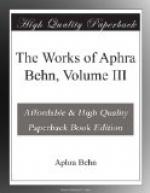to continue the journey alone. Isillia, Erminia’s
woman, has already admitted Philander to her mistress’
chamber, when the lovers are surprised by the arrival
of Alcippus on the scene. The prince is concealed,
although the meeting had been purely innocent, but
he is betrayed owing to the fact of his inadvertently
leaving his hat and sword upon a table. He departs
unmolested, but once he is gone Alcippus, beside himself
with blind fury, strangles Erminia with an embroidered
garter—Pisaro, coming in a few moments after,
reproaches him with the murder but hurries him away
to concealment. The deed, however, is discovered
and noised abroad by Falatius, a busy coxcomb courtier.
Orgulius demands Alcippus’ life from the King,
but Galatea, heart-broken, pleads for the man she
loves. Philander is distraught with grief, and
the King decides that if he harms himself Alcippus
shall straightway pay the forfeit. The prince
is about to wreak his vengeance on the cruel husband
when he is met by Erminia herself, who, owing to her
maid’s attentions, has recovered from the swoon
Alcippus took for death. It is resolved that Alcippus,
who is now torn with agony and remorse, must be fittingly
punished, and accordingly as he lies sick at heart
in his chamber Erminia enters as a spirit, and so
looking over his shoulder into a mirror wherein he
is gazing tells him plainly of Galatea’s love.
The princess then passes by as it were a phantom,
and after a masque, which he takes for a dream, he
is conducted to a room draped in black wherein is
placed a catafalque. Here he encounters Philander
and as they are at hot words the King, who has been
privy to the whole design, enters and the two are reconciled.
Erminia next appears, and the happy accident explained,
Erminia is bestowed upon the dauphin, whilst the princess
is united to the favourite.
There is a slight underplot which deals with the amours
of Aminta, sister to Pisaro, and Alcander. She
is also courted by the cowardly fop, Falatius.
SOURCE.
The Forc’d Marriage; or, The Jealous Bridegroom
is the earliest, and most certainly one of the weakest
of Mrs. Behn’s plays. This is, however,
far from saying that it is not a very good example
of the Davenant, Howard, Porter, Stapylton school
of romantic tragi-comedy. But Aphara had not
yet hit upon her brilliant vein of intrigue. In
The Forced Marriage she seems to have remembered
The Maid’s Tragedy. The situation
between Alcippus and Erminia, Act ii, III, has some
vague resemblance to that of Amintor and Evadne, Act
ii, I. Aminta also faintly recalls Dula, whilst the
song ‘Hang love, for I will never pine’
has a far-off echo of ‘I could never have the
power.’ But Mrs. Behn has not approached
within measuring distance of that supreme masterpiece.
THEATRICAL HISTORY.




